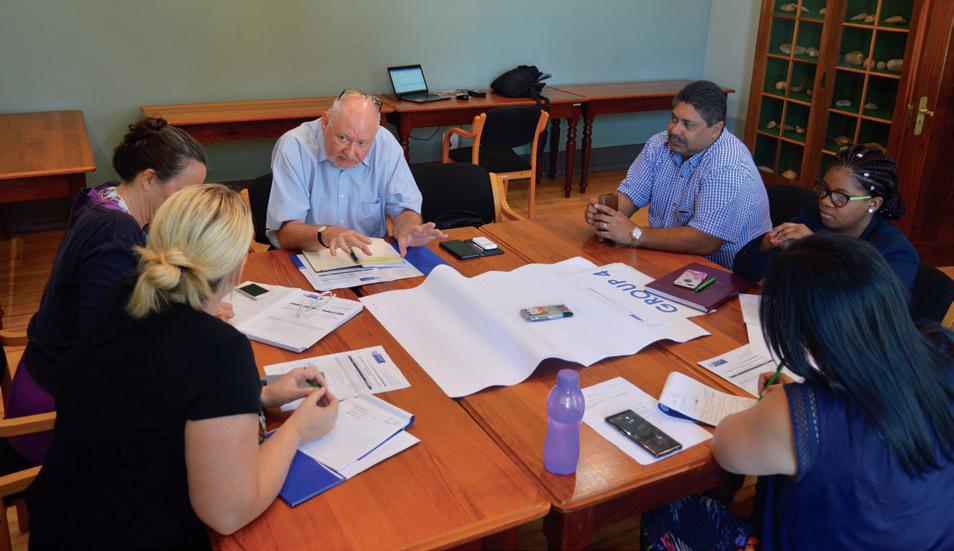
2 minute read
Philippi Horticultural Area (PHA) held inter-governmental inception workshop
by WCDOA pubs
by Douglas Chitepo and Karen Harrison
TThe purpose of this workshop, held in January 2019, was to mobilise public sector commitments to the PHA Socio-Economic Agricultural Plan, for the implementation of the Cabinet and Inter-Governmental Committee (IGC) decisions taken on 4 June and 8 August 2018 respectively.
Advertisement
Once the public sector commitments have been secured and finalised, the inclusion of broader stakeholders from private, civil and public entities, for example Airports Company of South Africa (ACSA), agricultural farming associations and agricultural research and training institutions, will be pursued. A “whole-of-society” approach will be applied to strengthen the coordination of inter-governmental and multi-stakeholder commitments. This will be formalised through an implementation protocol and social compact agreement. The City of Cape Town and the Western Cape Department of Agriculture (WCDoA) will drive the implementation of the PHA plan.
The plan is based on a study undertaken by a consortium of specialists managed by Indego Consulting and represented by Ms Karen Harrison. The search confirmed that the PHA is a significant area in terms of agriculture, the environment and heritage, given its unique combination of climate, water and soil. The PHA is located on the portion of the Cape Flats aquifer with the greatest groundwater potential. The environmental significance of the PHA primarily relates to the underlying Cape Flats aquifer, which allows at least three to four crop cycles per annum and can support expanded agricultural activity.
The PHA is currently actively farmed, with at least 64% of the “core” land under production. Thirty horticultural products are produced with carrots, lettuce, cabbage, spinach and cauliflower being the top five crops. There are about thirty farmers in the PHA, of whom five are classified as large commercial. For every R1 million spent in the vegetable industry, 4,65 direct jobs and 46,5 indirect jobs are created, translating into the PHA contributing about 3 000 direct jobs and 30 000 indirect jobs to the regional economy. The PHA further contributes about R484 million directly and R938 million turnover indirectly to the regional economy.
The large commercial farmers dominate the retail market, while smaller commercial and smallholder farmers focus more on supplying the Cape Town Market, the “bakkie traders”, middlemen and direct sales. The spread of markets supplied by the PHA makes the area critical for food security across all income groups. The proximity of PHA farmers to the markets lowers transport input costs, which translate into a moderating food price effect nationally.

There is substantial stakeholder agreement that the PHA needs to be retained for horticultural purposes and the Indego study highlighted substantial planning alignment. The adopted metropolitan Spatial Development Framework (SDF) 2018 identifies the PHA as a “critical natural area” owing to its agricultural and heritage significance and broader contribution to metropolitan food security, which must be protected.

Percentage of PHA farmers selling to market types
Percentage of PHA Farmers Selling to Market Types
Prefer not to say
Export
Public sector (e.g. schools, prisons)
Small independent green grocers
Epping or other fresh produce markets
Direct to the public
The workshop was attended by designated officials from provincial departments, the South African Police Service (SAPS) and representatives from the City of Cape Town, among others. Robust deliberations took place and some of the recommendations as proposed by the delegates are as follows:
• Re-prioritise government programme resources to give effect to the PHA Plan, within the context of broader resource limitations.
• Explore partnerships to leverage additional capacity.

• Ensure accountability for the implementation of the plan by all stakeholders.
• Promote inter-agency synergies – ensure that all entities are aware of one another’s initiatives in the PHA and facilitate collaboration.
• Align all public-sector projects and programmes.
• Find linkages across interventions within the PHA.
• Improve communication among role-players to ensure consistent messaging on PHA matters.
• Develop a media protocol.
• Avoid duplication and seek integration for greater efficiency of relevant participating government institutions.
Don’t know
Big five supermarkets
Restaurant chains/Franchises
Middle men
Hawkers /the bakkie trade / spazas
Own consumption
A full report of the “Socio-Economic Agricultural Plan” is available on the WCDoA website –www.elsenburg.com


